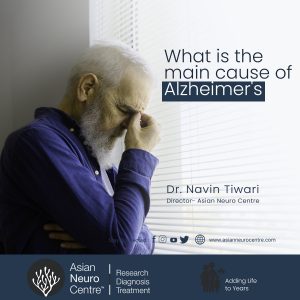- Have any questions?
- 911 12345 29
- info@asianneurocentre.com
What is the Main Cause of Alzheimer’s? – Asian Neuro Centre
What is Acute Spinal Cord Injury?, Symptoms, Causes, Treatment – Asian Neuro Centre
April 12, 2023Alzheimer’s Disease Life Expectancy – Dr. Navin Tiwari – Asian Neuro Centre
April 24, 2023What is Alzheimer’s?
Alzheimer’s is a progressive, irreversible disease that affects the brain, causing memory loss and a decline in other mental functions.
Early signs of Alzheimer’s include difficulty remembering recent events, disorientation, and difficulty performing familiar tasks. As the disease progresses, more serious symptoms such as confusion, agitation, and impaired judgment may arise.
Diagnosis of Alzheimer’s can only be made through a combination of physical and neurological examinations, laboratory tests, and a comprehensive medical history.
Medications, therapies, and lifestyle changes can help slow the progression of the disease and provide much-needed support to those affected.
Research suggests that staying healthy through regular physical activity, eating a healthy diet, and socializing with friends and family may help reduce the risk.

What is the main cause of Alzheimer’s?
Alzheimer’s disease is a progressive condition that affects many people. It is the most common form of dementia and is characterized by memory loss, confusion, and difficulty with daily tasks.
While there is no single cause of Alzheimer’s, research suggests that a combination of genetic, environmental, and lifestyle factors may play a role.
Some of the factors that play a role are:
- It is believed that late-onset Alzheimer’s is caused by a combination of genetic and environmental factors.
- Environmental factors may also contribute to the development of Alzheimer’s disease. Exposure to certain environmental toxins has been linked to an increased risk of Alzheimer’s
- Lifestyle factors, such as diet and exercise, may also play a role in the development of Alzheimer’s. In addition, regular physical activity has been linked to a lower risk of Alzheimer’s.
Conclusion
While there is no single cause of Alzheimer’s, research suggests that a combination of genetic, environmental, and lifestyle factors may play a role.
Genetics may be the main cause of late-onset Alzheimer’s, while environmental toxins and viruses may increase the risk of the condition.
In addition, following a healthy diet and getting regular exercise may help to reduce the risk of developing the condition.
Dr. Navin Tiwari
Consulting Neurologist
